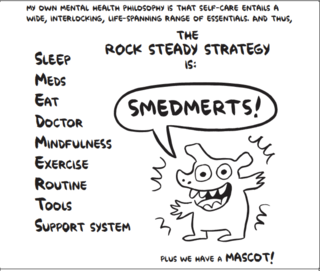Bipolar Disorder
Bipolar Survival Guide: Interview With Ellen Forney, Part 1
New graphic novel helps people find stability in bipolar lives
Posted July 16, 2018

Cartoonist Ellen Forney is the author of the best-selling comic memoir Marbles: Mania, Depression, Michelangelo, and Me. She makes public art, curates exhibitions, and works as an illustrator. She lives in Seattle and teaches at Cornish College of Art. Forney is proof that living well, creating art, and maintaining stability can sustain each other. A stable life can also be an exciting one. This is Part 1 of a two-part interview, about Forney's work, living bipolar, self-care, and the power of comics.
Marbles is full of details about your experience being diagnosed as bipolar and living with that diagnosis and your own symptoms. It's often hilarious, sometimes grueling, insightful, and pragmatic. Why was it important for you to follow it up with your new book, Rock Steady: Brilliant Advice from My Bipolar Life?
There are a lot of reasons!
A number of readers told me they use Marbles like a manual, which I find very satisfying. It was a deliberate choice to sprinkle in specific tools that the reader could try, instead of just mentioning them in the context of my story. Like, in one scene, I try CBT (cognitive behavior therapy) and explain what it is, and continue that I didn’t really find most of it useful except for one particular exercise, which I present in enough detail that the reader could try out. But there was a lot of important and helpful information that I didn’t include in Marbles, because there was only so much that could fit into the context of the story.
So especially after getting that reader feedback, I found myself wanting to offer readers more of what I’d learned, and as 1.) a cartoonist 2.) with bipolar, and 3.) strong opinions, and 4.) a sense of humor, who 5.) likes to understand and explain things, and 6.) do research, I thought I should really give it a go.

I believe there needs to be more emphasis on maintaining stability for the long term, which is a related but different set of issues than getting stable in the short term. (How can we fold these sets of healthy habits and behaviors into years – a lifetime – of stable mental health? What does that mean for students or professionals, if colleagues work all-nighters and we can’t? How do we keep a healthy relationship with substances? How do we deal with meds over the long term? How do we afford this stuff financially? How does this affect our sense of what we do and who we are? Etc.!) I have much to offer about this: the specific information in the book, of course, but also myself, as the author with an identity as bipolar, and a living example of long-term stability.
Compared with the other “survival guides” available now, my book comes from the point of view of someone who lives this – not a therapist or researcher, but someone inside the experience. Someone on the team.
You give your philosophy a hilarious acronym of a name. What does SMEDMERTS mean?

SMEDMERTS is: get good sleep, take your meds if that’s part of your therapy, eat well, see your doctor or follow the therapy that works for you, practice mindfulness and meditation, exercise, keep a routine, have plenty of coping tools, and maintain a solid support system. Most of those are therapies in their own right, but they need to work together holistically to be most effective. There’s also a lot we need to incorporate into our lives, outside of a clinical context.
I also believe it’s really important to consider a lot of different aspects of taking care of ourselves. There’s so much emphasis on meds right now, and a secondary focus on talk therapy, but relatively little emphasis on the many other things that we need to fold into our lives in order to get and stay healthy. That’s where SMEDMERTS comes in – the name is tongue-in-cheek but also very serious. It’s really the basic premise of Rock Steady.
I find the acronym helpful, and readers are picking up on it too. “Mind your SMEDMERTS!” is a multifaceted piece of advice. Also, SMEDMERTS has a “mascot,” a visual representation as a little jazz-hands monster. This gets back to the power of words and pictures, where one picture is not only worth a thousand words, one picture can also be worth a summary of a multifaceted, long-term treatment plan.
I made vinyl stickers of SMEDMERTS. I’ve gotten requests for SMEDMERTS objects, even through people didn’t know any existed. One of the self-care coping tools in Rock Steady is hugging a plush toy. I’m looking forward to a SMEDMERTS plush toy.
In your work, you make it very clear that bipolar experience is a little different for everybody. Do you have a personal definition that captures what’s common and what varies?
It can be tricky: we need to know that we’re not alone, that we have company, that there are a lot of experiences that we share; at the same time, our experiences are very different.
I think the DSM actually does a pretty good job of defining the basics that we share: cycles of periods of mania and depression, with mania involving decreased sleep and high energy, and depression involving sleep disturbance and low mood. But even there, you can see a subjectivity: “sleep disturbance” for depression may mean sleeping all the time, or trouble sleeping; “high energy” might mean aggravated and irritable, or euphoric (that’s how mania was for me, generally - euphoric). Some people have cycles that last for days, some for months; famously, different people respond differently to different therapies and different medications. Of course, context and resources are huge in how we experience our disorders. Some people can’t afford effective care, so their experience is related to that.
Can we talk about that subtitle? It cracked me up the first time I read it—possibly because after reading Marbles I felt pretty sure that you mean it both ironically and not ironically. Am I right about that? Calling yourself brilliant sounds a little bit lit like your manic self talking. On the other hand, you actually do have brilliant advice to offer.
Yes, ironically and not ironically. Here’s a place that the language of words and pictures comes into play, and the words alone don’t quite get the meaning. Next to the subtitle, I drew a little exhausted, overwhelmed face with its tongue out, which is intended as a counterpoint to “brilliant.” Sort of a “yeah right, whatever” but also “yeah, I have plenty worth listening to, because I’ve been stable for sixteen years now.” It’s taken a lot of effort but it’s important to me to take care of myself, for myself, for my family and the people who love me, and so I can help other people.
In part 2 of my interview with Ellen Forney, we'll discuss support systems, the intimacy of comics, and unexpected surprises that come with sharing images and ideas.
Note: If you send a self-addressed stamped envelope to Forney’s publisher, they’ll send you a free SMEDMERTS sticker: SMEDMERTS, c/o Fantagraphics Books, 7563 Lake City Way NE, Seattle WA 98115.




